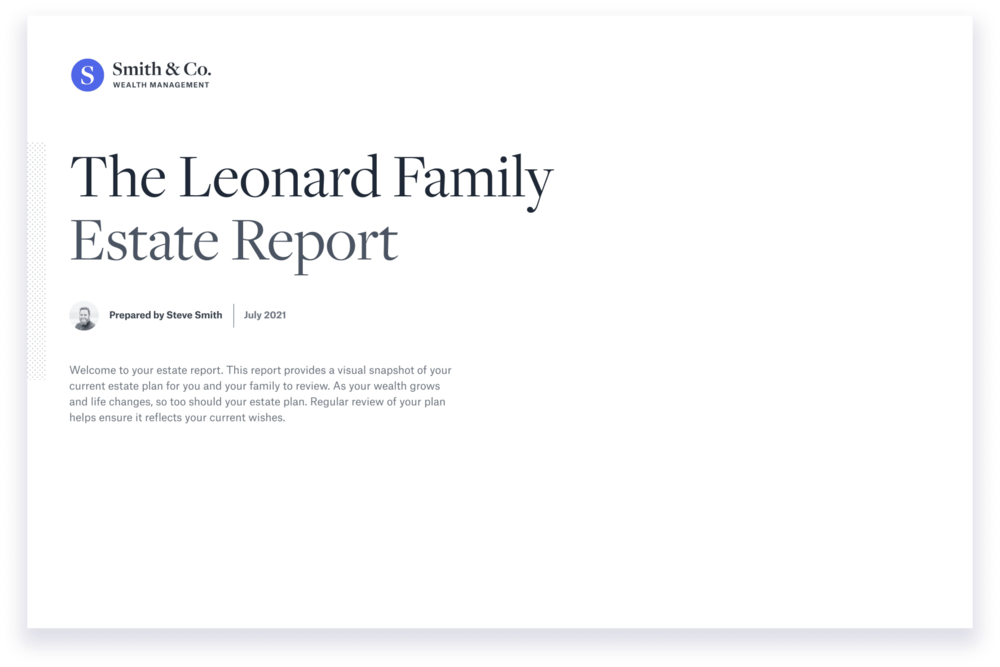 Vanilla
Vanilla
7 Major reasons why estate planning isn’t a ‘set it and forget it’ process

Imagine that you’re having your first consultation with a new client. You ask them whether they have an estate plan in place. They proudly tell you that they drew up a will and assigned guardianship as soon as their first child was born — 25 years ago.
Job well done, next question — right? Not quite!
Let’s examine why treating an estate plan as a one-off task comes with significant risks that could end in nightmare scenarios for your client and their family.
1: Beneficiaries and fiduciaries are often temporary
While your client may express a desire to designate loved ones, professionals, or organizations to manage and inherit their estate in perpetuity, life and time have a persistent way of diverting even the best-laid plans.
Let’s talk through the scenarios that may lead to your client changing a beneficiary or fiduciary:
-
A fiduciary can no longer manage the estate. An outdated estate plan may have fiduciaries who are too elderly or have passed away. Lawyers named as executors or trustees may no longer be in practice, and banks named as corporate fiduciaries may go out of business. If your client doesn’t already have a backup fiduciary designated in the event of their primary fiduciary’s inability to execute, they may need to work with an attorney to set one up.
-
A beneficiary passes away. Things can get complicated if a beneficiary dies before your client does. Not only could it impact the handling of your client’s estate, but it also interferes with administering the estate of the beneficiary — potentially leading to lengthy and costly legal proceedings.
-
A beneficiary moves out of the country. The need for multinational estate planning is becoming more common among affluent families. Suppose your client’s beneficiary changes their residence to a new country. In that case, your client should discuss the implications and make changes with an estate planning attorney well-versed in international estate laws.
-
A charitable beneficiary dissolves. If a favorite charity closes, your client must designate that portion of their estate to a backup beneficiary. A living trust can also make things more manageable if the nonprofit closes after your client’s death but before the gift’s full disbursement.
-
A client changes their mind. If your client loses trust in a fiduciary, they may need to designate a newer, more trustworthy executor or trustee. Likewise, if a client’s relationship changes with a beneficiary, they may need to update their estate plan to reflect their new wishes for inheriting assets.
The bottom line
If your client doesn’t keep their designations up to date, the estate may go into probate, or the wrong people could get their hands on your client’s assets. Encourage your client to confirm and update designations and contact information for fiduciaries and beneficiaries on a regular basis.
Vanilla makes it easy to keep your client’s estate information up-to-date with sophisticated opportunity generation tailored to your client’s current estate. To learn more about how Vanilla works, get in touch.
2: Family trees change and grow
Let’s face it: Your client’s family probably looks quite different today than it did five years ago. There’s even a good chance their family has changed over the past 12 months.
Here are a few of the many family-related situations that require updates to an estate plan:
-
A new child is born. New parents should work with an attorney to assess their estate to see if changes are necessary. Some clients may wish to create a trust instead of a will, and some may need to alter how their documents mention beneficiaries. If your client dies without proper estate plans for each new addition to the family, probate or family courts could determine their minor children’s fate.
-
The adoption of a child/addition of a stepchild. Estate planning involving children that aren’t biologically related comes with a unique set of challenges. If your client adds dependents to their household, they should consult with an attorney to understand their estate’s impact and any changes they need to make.
-
A child turns 18. Once their child becomes an adult in the eyes of the law, your client’s child may need new documents in place to ensure that their parents can make decisions on behalf of the not-quite-grown child.
-
An adult child is ready for the responsibility. It’s common for clients to update their estate to assign powers of attorney and fiduciary designations to adult children. If your client doesn’t update their estate plans in this scenario, their children can’t make important medical and financial decisions for elderly parents.
-
The birth of a grandchild. There are even more considerations around estate planning for grandchildren. Your client can work with an attorney to ensure the well-being of their grandchildren through several estate planning strategies, including 529 plans, a variety of generation-skipping trusts, and irrevocable life insurance trusts.
-
A new marriage. Your client’s new partnership comes with a long list of legal implications for their estate. Tying the knot often comes with tying assets together, designating beneficiaries, and setting up a revocable trust. If they don’t update their estate plan once they get married, your client risks leaving a widowed spouse without access to assets.
-
A divorce. Untying the knot means untangling the financial obligations your client had with their ex-spouse in their estate, including revoking and changing their will, changing fiduciaries and beneficiaries, and transferring powers of attorney.
The bottom line
Estate planning is all about protecting your client’s loved ones and legacy. An outdated estate plan can leave their family vulnerable. Initiate conversations with them about the importance of changing their estate plan to reflect the changes in their family.
3: Your clients are moving out-of-state
The good news: Your client has moved to a fabulous gated retirement community in a sunny coastal state. The bad news: There’s a good chance that their estate planning documents are no longer valid.
Why? It’s simple: Each state has its requirements on how estate planning documents should comply with state laws.
Here are a few documents that your client may need to change, per state laws:
-
Wills. Out-of-state wills sometimes pose legal problems and can lead to lengthy legal proceedings due to state marital property and executor laws. It may be worth it for your client to consult an attorney to see if they need to draw up a new will after a move.
-
Power of attorney/advance medical directives. Different states have contradictory laws regarding advanced healthcare directives. Your client may consider updating their documents to reflect the local laws, so there are no mix-ups in the event of a medical emergency.
-
Beneficiary designations. Although insurance beneficiary designations are valid in any state, your client should update their beneficiaries’ contact information whenever they move.
The bottom line
Help clients avoid legal complications by reminding them to update their estate planning documents once they establish residency in a new state.
4: Your clients inherit money and property
Windfalls, like inheritances, can seem fortuitous, but they also come with their own set of legal and financial challenges. To avoid unexpected taxes or costs, your client may have significant changes to make to their estate plan.
Here are a few things to consider:
-
They are inheriting a house. When clients inherit a home, they may want to live in it, sell it, or rent it out. The house’s ownership or sale is now a part of their estate, and they may need to work with a lawyer to update documents.
-
They are selling an inheritance. If your client sells inherited assets, such as real estate or stocks, they may owe taxes on the difference between the asset’s market value at the time of the decedent’s death and the price of the assets at the time of sale.
-
They are inheriting retirement funds. When a client inherits a retirement fund from someone other than a spouse, there are legal and tax considerations for handling the money.
The bottom line
Encourage your client to review their estate plan with an attorney so they can avoid the legal snags that come with a large inheritance.
Thanks to Vanilla’s attorney-integrated document creation process, you don’t have to be an expert to provide quality estate planning. As the trusted advisor, you can focus on what matters most—protecting their wealth and legacy. To learn more about how Vanilla works, get in touch.
5: Your clients mind their businesses
Your client may need to update their estate planning documents if they’ve started or closed a business or if it has changed hands.
More specifically, if your client runs a family business or co-owns a company, they should change succession planning documents in the following scenarios:
-
A relative no longer wants to run the business upon your client’s death.
-
A co-owner dies or sells their portion of the business.
-
A key employee designated for succession leaves the company.
The bottom line
Without updated estate planning documents, your client’s business may fall into the wrong hands, or their relatives may end up stuck with a company they don’t want.
6: Your clients are buying homes
It’s the dream of many Americans to buy a family home that will someday belong to their children and grandchildren. Ensure that your clients achieve that dream by advising them to update their estate planning documents after a significant real-estate purchase.
Here are some estate planning changes your clients may want to make after buying a home:
-
Update insurance policies. Your client may want to consider taking out a life insurance policy that could pay off their mortgage in the event of their death. That way, the surviving spouse isn’t left with large mortgage payments.
-
Update guardianship instructions. A designated guardian can live in the home with minor children in the event of their parents’ death. That way, the children can stay in their school district and grow up in the family home.
-
Consider how to include the home in a trust. The new home may be the single biggest asset your clients own. With a well-made trust, they can designate how they want their family to benefit from the purchase for years to come.
-
Consider how to divide a home between children. Depending on their state, there are tax implications involved in separating the home’s value among children and other beneficiaries. Plus, if one child wants the house and the others don’t, there may be legal costs involved in granting ownership to one child.
The bottom line
Without the proper estate planning documents in place, someone could sell the family home against the deceased’s wishes or cause a family feud over the house. Have your client consult with an estate planning attorney to discuss updating an estate plan to include a new home.
7: Health changes quickly and unexpectedly
The diagnosis of a progressive, sometimes terminal illness, like cancer or Alzheimer’s, is a cruel reminder that your health status can change quickly. Still, if your client lets you know they have a terminal diagnosis, you must encourage them to update their estate plan before they become incapacitated.
Here are some considerations for terminally ill clients when updating an estate plan:
-
If they haven’t already, the client should work with an attorney to establish advance health care directives and a medical power of attorney.
-
If the client is diagnosed with dementia, they may need to prove mental competence before changing their will or other estate planning documents.
The bottom line
In the case of a terminal illness, it’s a harsh reality that your client could die or lose mental capacity before they make their final wishes known. That’s why it’s critical to check in with your client regularly and empower them with the tools they need for proper estate planning.
Stay ahead of changes to your client’s estate plan with Vanilla Estate Reporting
Change is inevitable, but an outdated estate plan doesn’t have to be. With Vanilla’s visual and easy-to-understand format, you can keep your clients engaged with their planning as their life changes and wealth grows.
We recommend that financial advisors educate each new client on the importance of keeping their estate plan up to date. It’s also crucial (and smart business) to check in with established clients on a regular basis.
Vanilla estate reporting highlights several factors within an estate plan that prospective clients may be unaware of, including outdated information and opportunities for improvements. Download a sample report below.

Keep your clients’ estate planning in sync with changes in law or life circumstances
https://www.justvanilla.com/schedule-a-call
This article is for educational purposes only and should not be considered legal advice. If you feel that the information in this article is pertinent to your situation, you may wish to consult a qualified attorney for advice tailored to your circumstances.
Published: Dec 11, 2020
Holistic wealth management starts here
Join thousands of advisors who use Vanilla to transform their service offering and accelerate revenue growth.
